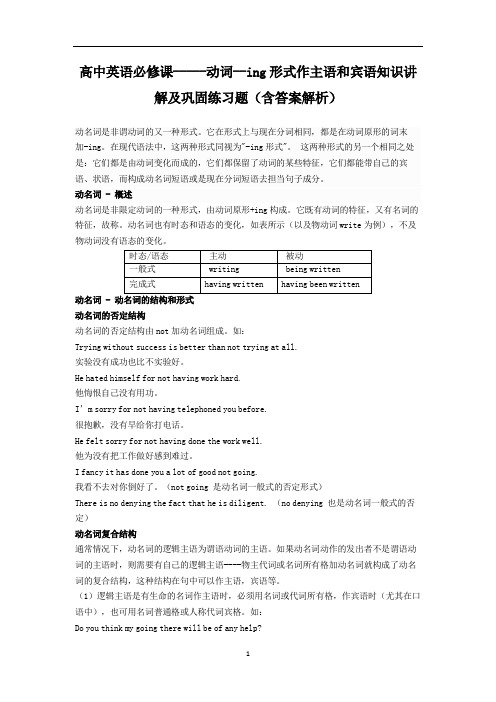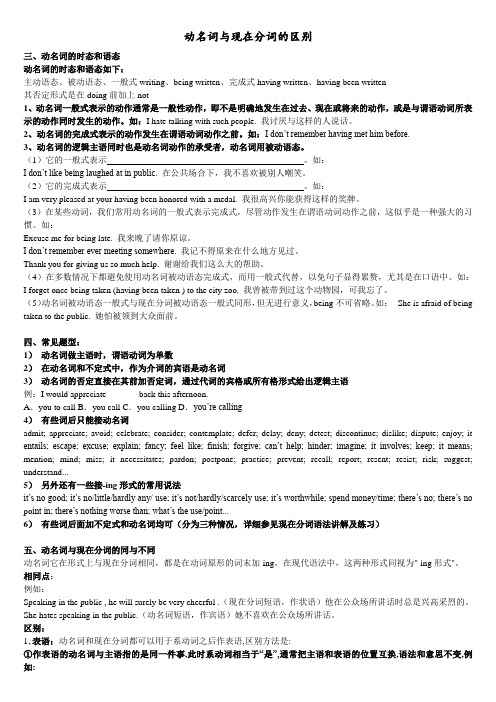高中英语高考语法现在分词动名词讲与练
- 格式:doc
- 大小:196.00 KB
- 文档页数:10

分词分词作宾语补足语。
1.现在分词和过去分词都可以作宾语补足语。
在5看(look at, see, watch, notice, observe);3使(make, let, have);2听(listen to, hear);1感觉(fell)。
,此外find, catch, keep, have.I heard a girl crying next door.I heard someone knocking at the door.He kept me waiting for a long time.I saw Tom entering the room.I found my key lost.I found the boy beaten black and blue.He made himself understood.John will get his room painted.Exercises1:1) I heard my name ________________ ( call).2) His voice was too low to make himself ________________(hear) .3) We found the eggs_________________( eat) by the snake.4) You’d better have/get your hair ______________ ( cut).5) I had my left arm________________(break) yesterday.ExercisesII:141. She was glad to see her child well __________.A. take care ofB. taken care ofC. taken careD. taking care of142. Why do you stand and watch the milk __________.A. boilingB. boiledC. from boilingD. having been boiled 143. I’ve heard him __________ about you often. A. spoke B. speaking C. speak D. to speak 144. Before he came to London, he had never heard a single English word __________.A. speakingB. spokenC. speakD. being spoken145. Walking along the river, we heard someone __________ for help.A. shoutingB. shoutC. shoutedD. having shouted146. I held the little bird in my hand and felt its heart __________.A. jumpingB. beatingC. bumpingD. knocking147. ---“Do you smell anything unusual?” ---“Yes. I can smell something __________.”A. burningB. is burningC. having burntD. burn148. Why do you have the water __________ all the time?A. ranB. to be runningC. runningD. being running149. Ellen was absent this morning because she had her tooth __________.A. fillingB. having been filledC. filledD. full150. I can’t ______ you running up and down all day long. A. permit B. let C. have D. allow 151. Is there anything you want from town? I’m going to get __________.A. those letters mailedB. mailed lettersC. to mailed those lettersD. those letters mail 152. The teacher got the students __________ all the words they didn’t know.A. looked upB. looking inC. to look upD. look at153. What did the school master want __________ to the noisy children?A. doingB. to doC. doneD. did154. They wanted the work _______with great care. A. to have done B. to be done C. doing D. to do 155. I need this chapter _______ before tomorrow. A. rewriting B. rewritten C. rewrite D. to write again156. Having read the Emperor’s New Clothes, we all found it __________.A. interestB. interestedC. interestingD. to interest157. When she returned home, she found the window open and something __________.A. to stealB. losingC. missedD. stolen158. My hometown is found __________.A. complete changingB. having completely changedC. completely changepletely changed 159. We found many people __________ in the meeting room.A. seatB. seatingC. to seatD. seated160. There was so much noise that the speaker could not make himself _________.A. being heardB. heardC. hearingD. hear161. Because of my poor English I’m afraid I can’t make myself _________.A. understandB. be understoodC. understoodD. understanding162. Don’t let him __________ you __________ for a long time.A. to make, waitB. make, to waitC. make, waitD. to make, to wait163. He kept me __________ for many hours.A. to waitB. having been waitedC. waitingD. waited164. Mother caught the boy _____in the corner. A. smoke B. to smoke C. smoking D. being smoked 165. John left his coat __________ on the sofa.. A. laying B. lying C. laid D. lain答案:141-145 BACBA 146-150 BACCC151-155 ACCBB156-160 CDDDB161-165 CCCCB分词做状语主动被动1) 一般式writing being written2) 完成式having written having been written1. Feeling tired, Tom went to bed early.2. Not wanting to wake her, Steve left the house silently3. Having finished his homework, he went out.4. Asked by my mother, I was eager to help her solve the snake problem.5. Having been told many times, she still can’t remember it.6. Given more time, I can do it better现在分词或分词短语做状语时,也可以表示时间、原因、结果、条件、让步、方式、伴随状况等.其逻辑主语必须和句子的主语一致,有时with\without +名词或代词宾格+分词也可以表示伴随状况如: While reading the book, he nodded from time to time. (时间)The teacher stood there, surrounded by the students. (方式)He sent me an e-mail, hoping to get further information.(伴随)分词作时间状语,如果先与主动词的动作,且强调先后,要用having done。

高中英语必修课-----动词--ing形式作主语和宾语知识讲解及巩固练习题(含答案解析)动名词是非谓动词的又一种形式。
它在形式上与现在分词相同,都是在动词原形的词末加-ing。
在现代语法中,这两种形式同视为"-ing形式"。
这两种形式的另一个相同之处是:它们都是由动词变化而成的,它们都保留了动词的某些特征,它们都能带自己的宾语、状语,而构成动名词短语或是现在分词短语去担当句子成分。
动名词-概述动名词是非限定动词的一种形式,由动词原形+ing构成。
它既有动词的特征,又有名词的特征,故称。
动名词也有时态和语态的变化,如表所示(以及物动词write为例),不及物动词没有语态的变化。
动名词-动名词的结构和形式动名词的否定结构动名词的否定结构由not加动名词组成。
如:Trying without success is better than not trying at all.实验没有成功也比不实验好。
He hated himself for not having work hard.他悔恨自己没有用功。
I’m sorry for not having telephoned you before.很抱歉,没有早给你打电话。
He felt sorry for not having done the work well.他为没有把工作做好感到难过。
I fancy it has done you a lot of good not going.我看不去对你倒好了。
(not going是动名词一般式的否定形式)There is no denying the fact that he is diligent.(no denying也是动名词一般式的否定)动名词复合结构通常情况下,动名词的逻辑主语为谓语动词的主语。
如果动名词动作的发出者不是谓语动词的主语时,则需要有自己的逻辑主语----物主代词或名词所有格加动名词就构成了动名词的复合结构,这种结构在句中可以作主语,宾语等。

高考英语二轮备考:动名词和现在分词的句法功能在英语语法中,动名词和现在分词的表达形式都是动词-ing形式。
在句法功能上,二者有相似之处,即都可以在句中作表语和定语,因而初学者常常会将二者弄混。
同时,它们也有着各自专属的句法功能,而且即便是在句法功能相同的情况下,二者所表达的意义也完全不同。
对此,为大家梳理了动名词和现在分词各自的句法功能以及它们在句中作表语和定语时的区别。
一、动名词的专属句法功能(一)动名词作主语动名词作主语时往往表示一种概念、习惯或者经验,表示一般的、抽象的或习惯性的动作。
非谓语动词中的不定式也可以作主语,但不定式作主语时表示具体的、一次性的或尚未发出的动作。
例句:Singing is my hobby,and to sing on a big stage is my dream.(二)动名词作宾语常见的接动名词作宾语的动词有:admit(承认),advise(建议),suggest(建议),consider(考虑),enjoy(喜欢),imagine(想象),mind(介意),permit(允许),risk(冒险),practice(练习),escape(逃避),delay(推迟)。
常见的接动名词作宾语的动词短语有:look forward to(期待),give up(放弃),keep on(持续),put off(推迟)。
此外,动名词既可以作动词的宾语,也可以作介词的宾语。
例句:After looking at the toy for some time,he turned around and found his parents were missing.(本句中,“looking”就是作介词“after”的宾语。
)二、现在分词的专属句法功能(一)现在分词作宾语补足语现在分词可以在hear、see、notice、watch、feel、smell、look at、listen to、observe、find等表示感官和心理状态的动词以及keep、have、leave、set、send这些动词后面作宾语补足语,和宾语共同构成复合宾语。

动名词与现在分词的区别三、动名词的时态和语态动名词的时态和语态如下:主动语态、被动语态、一般式writing、being written、完成式having written、having been written其否定形式是在doing前加上not1、动名词一般式表示的动作通常是一般性动作,即不是明确地发生在过去、现在或将来的动作,或是与谓语动词所表示的动作同时发生的动作。
如:I hate talking with such people. 我讨厌与这样的人说话。
2、动名词的完成式表示的动作发生在谓语动词动作之前。
如:I don‟t remember having met him before.3、动名词的逻辑主语同时也是动名词动作的承受者,动名词用被动语态。
(1)它的一般式表示。
如:I don‟t like being laughed at in public. 在公共场合下,我不喜欢被别人嘲笑。
(2)它的完成式表示。
如:I am very pleased at your having been honored with a medal. 我很高兴你能获得这样的奖牌。
(3)在某些动词,我们常用动名词的一般式表示完成式,尽管动作发生在谓语动词动作之前,这似乎是一种强大的习惯。
如:Excuse me for being late. 我来晚了请你原谅。
I don‟t remember ever meeting somewhere. 我记不得原来在什么地方见过。
Thank you for giving us so much help. 谢谢给我们这么大的帮助。
(4)在多数情况下都避免使用动名词被动语态完成式,而用一般式代替,以免句子显得累赘,尤其是在口语中。
如:I forget once being taken (having been taken ) to the city zoo. 我曾被带到过这个动物园,可我忘了。

高考英语语法复习非谓语动词知识讲解练习英语中的谓语是由动词来充当的,而动词除了可以作谓语之外,其实还常以非谓语的形式充当其他的句子成分。
按照动词是否充当谓语,我们可以把动词分为谓语动词和非谓语动词两类。
一、非谓语动词的含义非谓语动词首先是一种动词形式,其次是这种动词形式不能做谓语,综合这两点,我们将其叫做非谓语动词。
二、非谓语动词的形式非谓语动词包含四种形式,即不定式、动名词、现在分词和过去分词。
其中,每种形式按照发生时间和主被动又包括不同的子形式。
具体如下:1、不定式①基本形式:to do(表示主动,并且一般表示将来)②被动式:to be done(表示被动,并且一般表示将来)③进行式:to be doing (表示主动和进行)④完成时:to have done(表示主动和完成)⑤完成被动式:to have been done(表示被动和完成)⑥完成进行式:to have been doing (表示主动和完成进行)例如:The teacher told us to do morning exercises 、老师让我们做早操。
The car to be bought is for his sister.要买的这辆车是给他的姐姐的。
She spantended to be reading when the teacher came into the classroom.老师进来时,她假装正在读书。
The thief is said to have escaped.据说小偷已经逃跑了。
The thief is said to have been arrested.据说小偷已经被抓住了。
She is said to have been working in the factory over the last 20 years.据说在过去的20年里,她一直在这家工厂工作。
2、动名词①基本形式:doing (表示主动)②被动式:being done(表示被动)③完成式:having done(表示主动和完成)④完成被动式:having been done(表示被动和完成)例如:Travelling in space by ordinary people will be common in the future.在未来,普通人在太空旅行将会是普遍的事情。

高考英语读后续写微技能讲解练习一、修辞的运用在写作中使用修辞可以使语言更加生动形象、鲜明突出,加强语言表现力和感染力。
【常见的修辞手法】1.明喻My mother is as busy as a bee every day.2.暗喻Failure is the mother of success.3.拟人The flowers in the garden all lowered their proud heads.4.夸张When the girl heard the bad news, a river of tears ran down her face. 【翻译下列句子】1.花儿随风轻舞,娇羞又迷人。
(拟人)2.我孤独地漫游着,像一朵云。
(明喻)3.莉莉的声音在他听来像音乐般悦耳。
(暗喻)4.我姐姐吃得像小鸟一样少。
(夸张)5.鸟儿在树林里歌唱。
(拟人)【参考答案】1.Flowers dance lightly with the wind, shy and charming.2.I wandered lonely as a cloud.3.Lily’s voice is music to his ears.4.My elder sister eats like a bird.5.Birds are singing in the woods.二、动名词的运用动名词在句中可以担任主语、表语、宾语、介词宾语和定语,起名词作用。
【句的积累】1.作主语Learning English is not that difficult these days.2.作表语One of the office clerk’s duties is keeping documents.3.作宾语I suggested bringing the meeting to an end.4.作介词宾语We were surprised at finding the house empty.5.作定语Last month Mom bought a new washing machine.【翻译下列句子】1.现在担心没什么用。
高考英语写作专题:动名词、现在分词和过去分词.doc2019高考英语写作专题:动名词、现在分词和过去分词第7讲言简意赅的非谓语动词(1)——动名词、现在分词和过去分词一、动名词动名词是由动词的-ing形式构成,兼有动词和名词特征的非谓语动词。
它可以带有自己的宾语,也能被副词修饰。
动名词有时态和语态的变化,可以作主语、宾语、表语和定语等。
(1)Such rude riding contributes to the disorder of traffic.这样野蛮的骑车方式导致了交通混乱。
(2015·江苏)(2)Some students are addicted to playing computer games and some often cheat in the exams.一些学生迷恋玩网络游戏,还有一些经常在考试中作弊。
(2015·广东)(3)As for cheating in the exams,I will tell them the importance of honesty.至于考试作弊,我会告诉他们诚实的重要性。
(2015·广东)(4)As an old saying goes,living without a clear and achievable aim is like sailing without a compass.俗话说得好,生活没有明确的目标就好像航海没有指南针。
(2015·重庆)(5)Hope to meet you at the training camp this summer.希望在今年夏天的训练营见到你。
(2015·北京)(6)As a student,I can tell you that there is nothing better than being praised by my teacher before my classmates.作为一个学生,我可以告诉你,没有什么比在同学们面前受到老师表扬更好的事情了。
高中英语语法之动名词定义:动名词是一种兼有动词和名词特征的非限定动词。
它可以支配宾语,也能被副词修饰。
动名词有时态和语态的变化。
解释:动词的ing形式如果是名词,这个词称动名词。
特征:动词原形+ing构成,具有名词,动词一些特征一、动名词的作用动名词具有名词的性质,因此在句中可以作主语、表语、宾语、定语等。
1、作主语Reading is an art.读书是一种艺术。
Climbing mountains is really fun.爬山真是有趣Working in these conditions is not a pleasure but a suffer.在这种工作条件下工作不是一件愉快的事而是一件痛苦的事。
动名词作主语,有时先用it作形式主语,把动名词置于句末。
这种用法在习惯句型中常用。
如:It is no use/no good crying over spilt milk.覆水难收It is a waste of time persuading such a person to join us.劝说这样的人加入真是浪费时间。
It was hard getting on the crowded street car.上这种拥挤的车真难。
It is fun playing with children.和孩子们一起玩真好。
There is no joking about such matters.对这种事情不是开玩笑。
动名词作主语的几种类型动名词可以在句子中充当名词所能充当的多种句子成分。
在这里仅就动名词在句子中作主语的情况进行讨论。
动名词作主语有如下几种常见情况:1.直接位于句首做主语。
例如:Swimming is a good sport in summer.2.用it作形式主语,把动名词(真实主语置于句尾作后置主语。
动名词做主语时,不太常用it作先行主语,多见于某些形容词及名词之后。
例如:It is no use telling him not to worry.常见的能用于这种结构的形容词还有:better,wonderful,enjoyable,interesting,foolish,difficult,useless,senseless,worthwhile,等。
高中英语高考语法现在分词动名词讲与练①doing: 表示主动、进行。
作状语时, 表示与谓语动词同时发生,但有时也表示一个动作一完成, 另一动作马上进行。
doing在句中主要用作定语和状语。
②being done: 表示被动、进行。
在句中主要用作定语和介词宾语。
③having done: 表示主动、完成。
在句中通常用作各种状语, 表示比谓语动词先发生。
④having been done: 表示被动, 完成。
在句中通常用作状语, 表示比谓语动词先发生。
★A. 现在分词作定语: 只有doing, being done才能用作定语。
doing 作定语时, 如果是一个词就放于被修饰的名词前, 如是短语则放于被修饰的名词后。
being done只能放于被修饰的名词后。
1)The weeping girl is a nurse at the hospital.2)The girl weeping at the gate is a nurse at the hospital.3)The jeep being repaired at the garage will be given to Newton High School.◆以下作定语的doing结构不是表示进行, 而是表示经常性的动作或现在(当时)的状态。
1)The factory making toys is run by the town.2)The buildings standing at the foot of the mountain were built in the 1940s.◆现在分词doing作定语时, 表示被修饰的名词的动作。
a suffering farmer a sleeping student a swimming boythe laughing audience a dancing girl a flying kite◆动名词doing也可作定语, 但它表示被修饰名词的用途或性质。
a walking stick a dressing room a reading rooman operating table a meeting room a swimming poola washing machine building material writing paper1) The flowers______________ sweet in the botanic garden attract the visitors to the beauty of nature.A. to smellB. smellingC. smeltD. to be smelt2)The old building, ______________ to the city government, will be replaced by a modern hospital.A. belongedB. to belongC. belongsD. belonging3)The church, ______________ from the Qing Dynasty, is well protected by the local people.A. datingB. having datedC. datedD. being dated ★B. 现在分词作表语: 只有doing可以用作表语。
表示“使/令人……的”。
1)The news from the front is exciting.2)The result of the exam is disappointing.3)Don’t you think the soldiers’ stories are moving?◆以下动词除scare, delight, trouble,stress (使焦虑不安;使疲惫不堪)外均可加上ing,用作表语, 表示“使/令人……的”。
surprise, astonish, amaze, shock, frighten, terrify, alarm(使害怕/惊恐), touch, move, annoy(使生气/恼怒), bore(使厌烦), disturb(使焦虑/烦恼/不安/惊讶), please, amuse, fulfill(使高兴/满意), encourage, inspire, tire, exhaust, interest, satisfy, excite, relax, disgust(使反感), worry, frustrate(使沮丧), disappoint, embarrass, confuse, puzzle, thrill, depress, convince…boring : 令人生厌的; 令人厌倦的; 没趣的; 乏味的; 无聊的annoying: 使人烦恼的/心烦的/生气的; 使人气恼的/恼火的/讨厌的【scare --- scary】【delight ---delightful】【trouble ---troublesome】【stress -- stressful】【upset ---upsetting】★C. 现在分词作时间状语: doing, having done, having been done均可用作时间状语。
1)Working in the countryside, they learned a lot from the farmers.2)Arriving at a strange-looking house, she showed me into a large, bright clean room.3)Having waited in the queue for half an hour ,the old man suddenly realized he had left the checkin the car.4)Having been shown around the Summer Palace, we were then taken to see the Great Wall.★D. 现在分词作原因状语: doing, having done, having been done均可用作原因状语。
1)Seeing that she was going off to sleep, I asked if she’d like that little toy on her bed.2)Not realizing that he was in great danger, Jim walked deeper into the forest.3)Being a student, you should obey all the rules of the school.4)Being ill, her grandmother didn’t walk her dog this morning.5)Having caught the 7:30 train from Boston, I got to the office early that day.6)Not having completed the project, they have to stay there for another five weeks.7)Having been given the right change, she left the shop in a hurry.◆以下划线部分在句中作原因状语:1)Strong, proud, and united, the people are the modern heroes of the city.2)Cold and hungry, the soldiers had to go back to their camp.★E. 现在分词作结果状语: 只有doing可以用作结果状语。
1)More highways have been built in China, making it much easier for people to travel from oneplace to another.2)A small plane crashed five miles east of the city, killing all four people aboard.3)It rained heavily in the south, causing serious flooding in several provinces.4)He cut off the electricity quickly, preventing an accident.★F. 现在分词作目的状语: 只有doing可以用作目的状语。
1)The man has come to the city, looking for his lost wife.2)The lawyer listened with full attention, trying not to miss any point.【以上两句的doing短语可改为to do短语,但to do 前一般不加逗号。
】★G现在分词作伴随状语: 只有doing可以用作伴随状语。
1)The girl walked out of the hospital, singing and dancing.2)“We can’t go out in this weather,” said William, looking out of the window.3)The boys are standing/sitting (by the windows) playing games.4)Do you wake up every morning, feeling energetic and ready to start a new day?5)Throwing their hats into the air, the fans of the winning team let out loud shouts of victory.◆以下划线部分在句中作主语补语:1)After the long journey, the three of them went back home, hungry and tired.2)After the college entrance exams the students came back to the school, exhausted but happy.3)Surprised and happy, Tony stood up and accepted the prize.★H. 现在分词作条件状语: 只有doing可以用作条件状语。